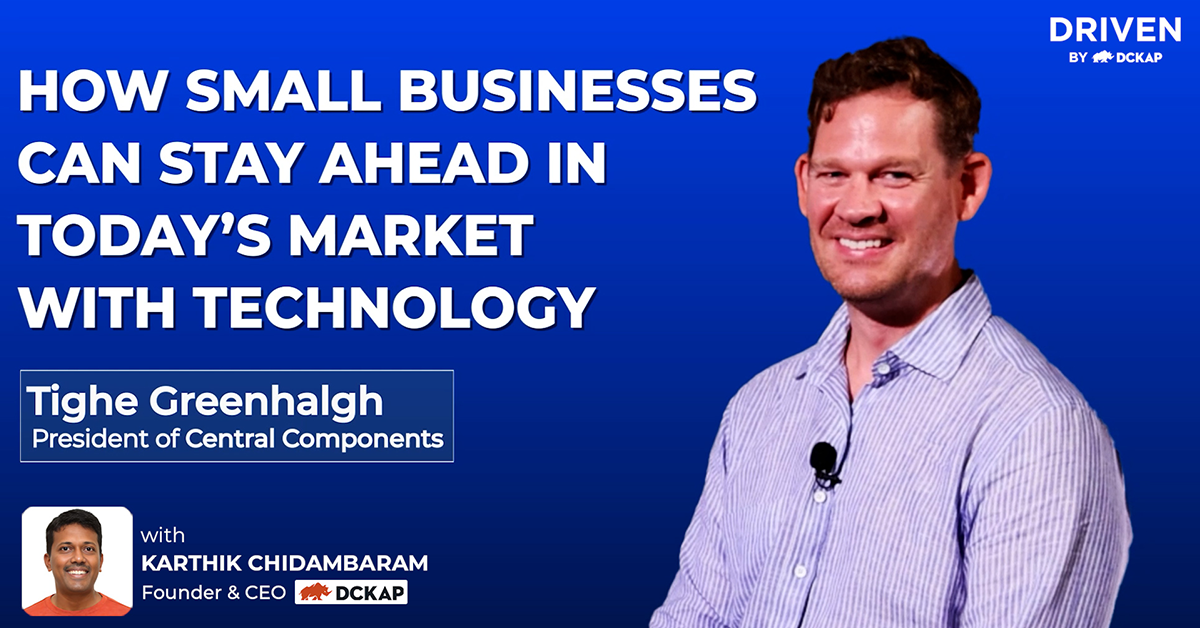I recently sat down with Tighe Greenhalgh, President of Central Components, a family-owned business in the industrial distribution sector. He shared how they find customers using classic approaches and why personal relationships are what truly set small businesses apart. We also dived into two essential strategies: how small businesses can successfully find customers the old-fashioned way and how they stand out in a world where bigger is often seen as better.
Finding & Winning Customers the Old-Fashioned Way
With social media and online marketing dominating today’s business landscape, many small businesses still rely on traditional methods to attract customers. Central Components, for example, focuses on in-person interactions and building trust over time. “We rely on trade shows, visiting businesses directly, and picking up the phone to reach out to potential customers,” says Tighe. While this approach may seem outdated, it remains highly effective.
Why does this method still work?
The answer is simple: people still value personal connections. Even though technology has transformed the way businesses operate, the core of customer relationships remains the same. People want to do business with those they trust, and building trust often requires real-world interactions. While larger businesses may rely on automated systems and mass-marketing strategies, small businesses have the unique advantage of being able to form these connections in person.
Trade shows and networking events are still crucial for small businesses looking to connect with potential customers. In fact, trade shows remain one of the most powerful tools for customer acquisition. Attending trade shows allows businesses to demonstrate their expertise and connect with people who may be interested in their products or services. “You get to sit down with potential customers, face-to-face, and have real conversations,” says Tighe. This builds trust in a way that a simple email or digital ad can’t replicate.
Moreover, small businesses can use these opportunities to listen to what customers need and offer tailored solutions. Tighe explains that customers often prefer working with a business that can take the time to understand their specific challenges and provide customized solutions. While a large corporation like Amazon may offer a wide range of products, they can’t offer the same level of personalized service.
The Power of Personal Relationships
Building personal relationships is one of the strongest advantages small businesses have over larger competitors. As Tighe pointed out, “Customers today are reluctant to add new vendors because there’s a lot of setup involved. We try to simplify that process and focus on building relationships from the start.” This approach allows small businesses to offer something big companies can’t: a tailored, human touch.
Larger companies may have impressive tech, broad product ranges, and deep pockets, but they often lack the personal connection that small businesses provide. Think about it: when you buy from a big company like Amazon, you’re just another customer in a sea of millions. But when you work with a small business, you’re a valued partner.
The key here is understanding that relationships matter. Small businesses have the flexibility to make things happen for customers in a way that larger companies can’t. When something goes wrong, a small business can pick up the phone and resolve the issue immediately. There’s no need for long waits or endless emails to customer service. The customer knows they matter, and that’s what keeps them coming back.
Additionally, personalized service means that small businesses can help customers in ways that bigger corporations can’t. Tighe explains that when a customer needs a specific product, they can often rely on Central Components to deliver exactly what they need, even if it’s a niche item. The personal attention to detail helps businesses like Central Components stand out in a crowded market.
Competing with Big Corporations: What’s the Secret?
The big question is: how do small businesses compete with the likes of Amazon, Walmart, or other massive corporations? The key is differentiation. While larger companies may have more resources, small businesses can compete by offering something different: personal service, expert knowledge, and tailored solutions.
“Big corporations may be able to offer lower prices, but they can’t provide the kind of personalized service we can,” says Tighe. Smaller companies can often be more flexible with pricing and more responsive to customer needs. They don’t have layers of bureaucracy to navigate, and they can adjust quickly to meet the demands of their customers.
For instance, Central Components focuses on building relationships with customers over the long term, rather than simply making a quick sale. Tighe explains, “It’s about making the customer feel valued and providing them with the best service possible. The bigger players can’t always do that because they’re too focused on volume.”
According to a 2020 report by Salesforce, Ninety percent of customers say how a company acts during a crisis demonstrates its trustworthiness. Small businesses can build stronger relationships by taking the time to understand what their customers need and providing solutions that are customized to them.
Smaller businesses are often able to offer more competitive pricing than larger companies, thanks to their lower overhead costs. Tighe highlights that Central Components can often provide better pricing for its customers because it doesn’t carry the same operational costs as bigger players. This is another key advantage small businesses have when competing with larger corporations.
The Role of Technology for Small Businesses
While personal relationships are essential, small businesses can’t ignore the role of technology. Tighe recognizes that integrating modern tools into their business processes is necessary for staying competitive. Central Components is in the process of upgrading their website and focusing on digital marketing to automate tasks and reach more customers.
However, even as they invest in technology, Tighe emphasizes that the core of their business is still about the people. “We want to keep our technology on par with the bigger players, but ultimately, it’s the personal relationships that matter most,” he says. This balance between leveraging technology and maintaining personal connections is what allows small businesses to thrive in a digital world.
For small businesses, the right technology can help improve customer experience and streamline operations. Investing in customer relationship management (CRM) software, for example, can help small businesses better track interactions, manage leads, and respond quickly to customer inquiries. Additionally, tools like email marketing platforms and social media automation can help businesses stay visible and engage with their customers consistently.
Building a Brand That Competes
Branding plays an important role in helping small businesses stand out from larger competitors. While a big company may have the advantage of widespread brand recognition, small businesses can build a strong, personal brand that connects with customers on a deeper level.
Your brand is about more than just a logo or tagline; it’s about the experience you provide and the values you stand for. Small businesses can build a loyal customer base by offering consistent, high-quality products or services and by showing that they care about their customers’ needs. The story behind your business—why you do what you do and how you treat your customers—can set you apart in ways that a massive corporation can’t replicate.
Small Businesses Can Compete by Focusing on What They Do Best
Competing with big corporations doesn’t have to be an impossible task. Small businesses have unique advantages that, when leveraged correctly, can help them thrive. By focusing on personalized service, building relationships, and offering flexible solutions, small businesses can compete in a world that’s often dominated by bigger players.
As Tighe Said, “It’s all about making the customer feel valued.” When small businesses prioritize their customers and focus on providing exceptional service, they create a loyal following that big corporations can’t replicate.
So, while technology and automation are important, don’t forget the power of human connections. Embrace what makes your business unique, build strong relationships, and watch your small business thrive even in the face of giants.
Contents




